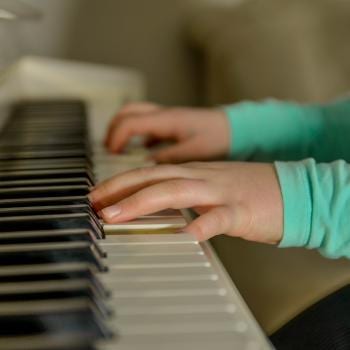I have been really surprised by the response to the post I put up this morning about Sally’s scissors. In that post I told what was for me an important moment of self-discovery, and I used that moment to draw out a more important point, and yet the majority of the commenters there responded by telling me that there’s nothing wrong with taking away a child’s scissors, that I shouldn’t feel bad about acting out in anger toward Sally because everyone’s human, and even that Sally was likely just “playing” me. From a bit of distance I can see the points these commenters were trying to make, but feel like they are missing the main point of my post, which didn’t really have anything to do with whether or not taking a child’s scissors is ever an appropriate comment, whether it’s normal to sometimes act in anger toward a child, or whether children are always honest. So let me use this post to add a bit of detail and see if I can’t explain it better.
 For me, positive parenting is most primarily about listening and connecting rather than about reacting and punishing. In the incident I described in that post, I reacted and punished rather than listening and connecting. I was wrong. Did I commit some huge sin or scar Sally for life? No! But to suggest that I did nothing wrong at all when in reality I acted in the face of my core parenting values? Sorry, no. I absolutely handled this situation wrong, and I’m absolutely going to learn from it.
For me, positive parenting is most primarily about listening and connecting rather than about reacting and punishing. In the incident I described in that post, I reacted and punished rather than listening and connecting. I was wrong. Did I commit some huge sin or scar Sally for life? No! But to suggest that I did nothing wrong at all when in reality I acted in the face of my core parenting values? Sorry, no. I absolutely handled this situation wrong, and I’m absolutely going to learn from it.
When I was a child, my parents would say “there will be consequences!” And by consequences, they meant spankings. I think too often people jump to the word consequences and assume that consequences are totally differently from punishment. Not so. Consequences are very often experienced as punishments, and when it comes to kids what matters is how they experience it. If they experience something otherwise than how you intended it doesn’t matter how you intended it, because they still experienced it the way they did and your intent doesn’t change that. The line between punishment and consequences becomes blurred and sometimes even irrelevant, and I think all too often we as parents use the veil of “consequences” to mete out punishments.
After Sally cut the couch, I took her scissors away before even talking about what had happened with her. I took them away before listening or connecting or having a any sort of conversation with her about the incident. I took them away because I wanted to make her feel as sad as I was feeling so that she would suffer for what she had done and not do something like that again. I pretended it was a consequence when really what I wanted to do was punish. And that was wrong of me.
If Sally hadn’t been sorry, or if I actually thought she might cut furniture again, taking away the scissors might be completely appropriate. Even then, though, it should be done in the context of conversation, explanation, and honest communication. A parent can easily say, “I am not taking these scissors away because I want to be mean, and I do understand why you did what you did. If I were your age I’d probably find cutting up a couch interesting too. But it’s important that our furniture doesn’t end up cut up, so I’ll take care of your scissors for you until you’re able to keep them without cutting things you’re not supposed to cut. Don’t worry, I’ll give them back.” When a parent does that, he or she establishes that the removal of the scissors is not a punishment or intended to be adversarial. But I didn’t do any of that.
The whole point of my post, too, was that I didn’t NEED to do any of that. If I’d simply approached Sally and talked to her about why we shouldn’t cut furniture and why it made me sad that she cut the couch, that would have been enough. I know my child. She would have realized the problem with what she had done and, with my help, would have understood why she shouldn’t do it again in the future. Sally didn’t cut the couch to spite me. She didn’t cut the couch to make me feel sad. She cut the couch because when you’re in preschool, cutting things like fuzzy couches is interesting. All I needed to do was talk to her, listen to her, communicate with her, and connect with her. Instead I chose to punish her, under the guise of “consequences.” That was wrong of me.
I’m reminded of a time when one of my brothers did something similar, cutting up a stuffed animal to see what was inside. He was curious, you see. Afterward he realized that he would get in trouble for what he did, and he was so terrified of the punishment he would receive that he planted the evidence and framed one of my other siblings for it. Instilling that kind of terror in a child is extremely inappropriate, and I don’t want my daughter to ever respond to realizing she’s done something wrong by feeling that she has to hide it out of fear of punishment.
Some commenters have suggested that Sally was playing me later in the day when she brought up the incident and remembered only my punishment and not what she had done. I refuse to approach my daughter with suspicion or assume that she’s out to “play” me. That’s how the Pearls urge parents to approach their children. I will never, ever do that. I will be open and honest and respect her as an individual, and unless there is solid evidence to the contrary I will assume that she is the same with me. Look, I know my daughter. I also know what it was like to be raised by parents who assume that their children were out to get them. When you’re a child and your parents are ascribing all sorts of terrible motives to you and refusing to take what you’re saying at face value, and instead assuming that you, the child, are lying or engaged in some plot to cause them mental anguish, I can’t even begin to describe how much that sucks.
This suggestion that Sally was playing me also flies completely over the point I was trying to make. That readers would be incredulous that the punishment would make a greater impression on Sally than what she’d done before it shows how backwards we can sometimes be in how we approach teaching children lessons. If a child remembers the punishment but not what they did beforehand, that doesn’t not evidence that they’re “playing” the adults in their world but rather evidence that the way the adults are approaching teaching the child is ineffective and needs to be changed. There were plenty of times as a kid that I remembered the punishment but not what I’d done before hand. My takeaway was not “this is why not to play with matches” but rather “don’t do something to make mom angry or she’ll hold you down and hit you.” I don’t want Sally to remember “don’t get on mom’s bad side or she’ll take your stuff,” I want her to remember “here is why we don’t cut the couch, and here are the things we can cut.”
Finally, some readers suggested I was being too hard on myself, and pointed out that it’s fine and normal for parents to get angry. This is true. However, my post was not one of self-hate but one of self-discovery—and besides that, while it’s true that parents do sometimes mess up and act out of anger toward their children, that does not make it “okay.” It’s still wrong. But the point of my post wasn’t to hate on myself but rather to detail what was for me an extremely positive reminder regarding how to most productively approach situations where Sally has done something wrong. And that was it. I’m not beating myself up over anything.
And finally, did anyone miss the thought-provoking questions I finished the post with? The post wasn’t designed to be a be-all end-all, but rather an opening to a conversation I think we need to have and a way to bring up some things I think we, as parents, need to think about. I’ll finish this post by restating them:
How often do we threaten children with punishment when a conversation would work just as well? How often does punishment send different messages than intended? How often do we miss opportunities to teach life skills and focus instead on threatening our children?














